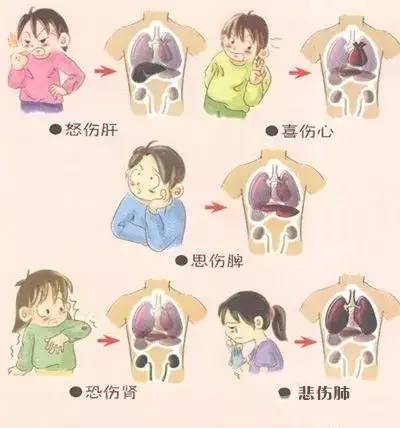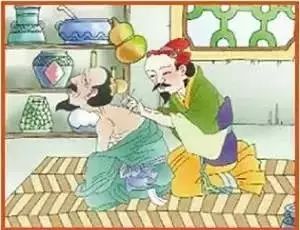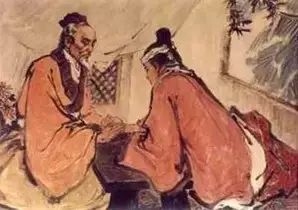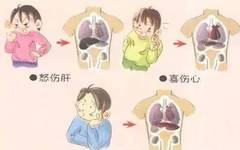The seven emotions, namely joy, anger, worry, thought, sadness, fear, and shock, represent the seven types of emotional activities in the human body.These emotions are different psychological states triggered by various external stimuli. Generally, the seven emotions are normal responses to external factors and do not cause illness. However, if external mental stimuli are sudden and prolonged, leading to excessive emotional responses, it can result in disease. Such excessive emotions are significant pathogenic factors in internal injuries.

Traditional Chinese Medicine (TCM) believes that emotional activities are closely related to the five organs. The emotional changes in the human body caused by external environmental factors arise from the physiological activities of the five organs, thus the seven emotions are referred to as the five desires, corresponding to the five organs. Excessive emotions, as mental pathogenic factors, can directly damage the corresponding organs.
It is generally believed that joy and shock harm the heart: excessive joy or shock can lead to restlessness, palpitations, insomnia, and even manic episodes; anger harms the liver: extreme anger causes qi and blood to rise, leading to excessive liver fire, manifested as a flushed face and irritability; thought harms the spleen: excessive thinking can lead to qi stagnation, causing the spleen to lose its function, resulting in reduced appetite, loose stools, and fatigue; sadness and worry harm the lungs: sadness and worry can deplete lung qi, leading to a weak voice and hoarseness; fear harms the kidneys: during fear, qi and blood descend, resulting in a pale complexion, dizziness, and even incontinence.
Emotional damage to the five organs leading to disease is due to chaotic qi movement, abnormal blood circulation, and imbalance of yin and yang. Some may ask, can we use the power of emotions to treat diseases caused by emotional injuries? Yes, there are many such examples. TCM has created emotional therapy over thousands of years of practice, leaving behind many remarkable stories of treating emotions with emotions.
Using Anger to Alleviate Worry
During the Warring States period, King Min of Qi suffered from depression and consulted several doctors without success. He then invited the famous physician Wen Zhi from Song to treat him. After understanding the condition, Wen Zhi told the prince, “The king’s illness can only be cured by provoking his anger. But if I anger him, he might kill me.” The prince reassured him, “As long as you cure my father’s illness, my mother and I will ensure your safety.”
Thus, Wen Zhi and King Qi agreed on a time for treatment, but he did not show up. He missed the second and third appointments as well. King Qi was furious, scolding Wen Zhi for being untrustworthy and swore never to invite him again. Unexpectedly, a few days later, Wen Zhi suddenly appeared uninvited, did not greet or inquire about the king’s health, and rudely climbed onto King Qi’s bed while examining him. King Qi was so enraged that he sat up and scolded Wen Zhi. As a result, this anger and scolding cured the depression without medication.

Long-term sorrow can lead to stagnation of lung qi, causing blocked qi movement and lack of spirit. Sudden anger can stimulate emotions, causing qi and blood to rise and qi movement to become smooth. Although the prince and the queen could not save Wen Zhi’s life, he was ultimately killed by King Min of Qi. However, the case of Wen Zhi curing King Min of Qi demonstrates that TCM had already utilized psychological therapy to treat diseases over two thousand years ago.
Using Sadness to Overcome Joy
During the Ming Dynasty, there was a man named Li Dajian. His family had been farmers for generations, but through hard work and study, he became a successful scholar. His father was so happy that he boasted about his son’s achievements to everyone. Later, Li Dajian passed the imperial examination and became a high official. His father was so delighted that he laughed uncontrollably, even at night. After ten years, he still could not stop laughing. Li Dajian sought the imperial physician to treat his father. The physician sent someone to Li’s hometown to report the death of his father, saying, “Your son has unfortunately passed away due to a serious illness.” Upon hearing this terrible news, his father was heartbroken and cried for over ten days, and his laughter naturally ceased. Then, the physician sent someone to inform his father, “Your son is not dead; fortunately, the physician’s miraculous skills have brought him back to life.” After hearing this, Li’s father stopped grieving, and the laughter illness did not recur.

Moderate joy can make a person feel happy, harmonizing qi and blood, thus benefiting health. However, suddenly receiving something one has long desired can lead to scattered spirit and loss of focus. The physician used “sadness” to suppress Li’s excessive “joy,” ensuring that joy does not become excessive and sadness is timely, which is truly admirable.
Using Joy to Treat Sadness
During the Yuan Dynasty, there was a scholar whose wife passed away shortly after their marriage. After days of sorrow and crying, he became bedridden. His father took him to seek medical help, but there was no improvement. One day, they encountered Zhu Danxi and asked him to save his son. Zhu Danxi inquired about the patient’s discomfort, then carefully took his pulse, and said to himself, “It seems there is joy. You see, you have no appetite and feel weak all over, right? That indicates joy; I will prescribe a formula to protect the fetus.” He then pretended to write a prescription. The scholar could not help but burst into laughter, saying, “What kind of famous doctor cannot even distinguish between genders?” Afterward, whenever he thought of this incident, he would laugh. After half a month, he unknowingly recovered. At this time, someone told him that Zhu Danxi had cured him with laughter, and the scholar suddenly realized that Zhu Danxi’s medical skills were indeed remarkable.

The scholar’s illness stemmed from the grief of his wife’s early death. Excessive and prolonged sadness weighed heavily on his heart, making him gloomy. Zhu Danxi, in order to treat his illness, did not hesitate to set aside the dignity and seriousness of a doctor, using humor to make the patient laugh involuntarily, ultimately leading to emotional harmony and the resolution of the illness.
Using Shock to Overcome Joy
Wu Jingzi recorded the story of Fan Jin in “The Scholars.” In the Qing Dynasty, Fan Jin participated in the imperial examination for many years and finally succeeded in becoming a scholar at an old age. Overjoyed, he became delirious, laughing uncontrollably, saying, “I passed! I passed!” Someone suggested that he needed to be frightened to recover. Who could scare him? He was usually afraid of his father-in-law, the butcher Hu, so they decided to let Hu scare him. Hu slapped him hard and scolded, “You worthless beast! What did you pass? The words of the examiner are lies.” Upon hearing this, Fan Jin fainted, and when he woke up, his madness had disappeared.

Achieving success in the imperial examination and escaping a life of poverty and humiliation was Fan Jin’s lifelong dream. However, once this dream was realized, excessive joy caused him to lose focus and become distracted. The butcher’s slap used “shock” and “fear” to eliminate the extreme “joy,” stopping the madness.
Using Anger and Joy to Treat Thought
A merchant had been away for many years, and his wife, missing him, lost her appetite and gradually became emaciated. Zhu Danxi diagnosed her and told her father that this illness required emotional therapy to be effective. He instructed her father to slap his daughter a few times and scold her loudly. The girl, originally a rich young lady, was now being slapped for no reason, feeling both angry and upset, and could not help but cry out loud. Surprisingly, after this cry, she suddenly felt like eating something by evening. Zhu Danxi prescribed some medicine and instructed her father to tell her that her husband would be home soon. Upon hearing this, the girl was overjoyed, and her condition quickly improved.

Long-term excessive thinking leads to stagnation of qi, causing the spleen and stomach to lose their function, resulting in loss of appetite, fatigue, and muscle wasting. Zhu Danxi first used “anger” to slightly relieve the stagnation of “thought,” and then used “joy” to open her heart, completely curing her emotional ailment.
Using Shock to Stop Shock
During the Song and Yuan Dynasties, a woman from an official family suffered from “shock disorder.” She was particularly timid and panicked at the slightest sound. Her family invited many local doctors and tried various expensive medicines, but her condition not only did not improve but worsened. Her family had to keep quiet and tiptoe around, afraid to make any noise. Later, the famous physician Zhang Zihe passed through the area. The family invited him to treat the woman.
Zhang Zihe learned about the cause of her illness. It turned out that not long ago, a group of robbers had come to rob the place, setting fire and killing people as they left. The woman was so frightened that she hid in the house, trembling all over, and from then on, she developed this illness. After thinking for a moment, Zhang Zihe said that there was a way to treat this illness. He had the maid help the patient stand on a high stool, with a wooden table in front of her, and then he struck the table loudly. The patient was so frightened that she almost fell down. Zhang Zihe said, “This is just knocking on a piece of wood; there is no need to be afraid.” He then continued to strike the table, gradually increasing the volume. The patient slowly became less frightened than before. Zhang Zihe then had people knock on doors and windows at night, even beating drums. At first, the patient was scared, but soon she became calm. After several days, the woman no longer showed signs of fear towards outside noises.

The woman’s illness arose from “shock.” Her family, worried about frightening her, did not dare to make any noise, which only worsened her condition. Zhang Zihe took the opposite approach, first using a small sound that she could accept, then gradually increasing the volume, ultimately restoring her to normal.
Four Rules for Maintaining a Good Mood
Excessive emotions can directly affect the physiological functions of the internal organs, leading to various pathological changes. Different emotional stimuli can harm different organs, resulting in various pathological changes.So, what methods can we use in daily life to regulate our emotions and maintain a good mood?

1
Understand why emotions arise and whether they come on too strong or too quickly. Therefore, one should cultivate the ability to cope with emotions—independence + cooperation. Improve the ability to handle certain events, such as how to face the loss of a loved one? How to further coordinate with colleagues when problems arise? From a young age, do not rely too much on parents; try to have your own opinions and learn from good examples to change your shortcomings. Being good at self-criticism will empower you.
2
Improve your physical fitness. A stronger body increases tolerance to emotions. Engage in more outdoor activities, cultivate regular sleep habits, and try to avoid staying up late and nightlife. More than 90% of people with emotional disorders have sleep disturbances. Good sleep habits are as impactful on emotions as innate personality traits.
3
Increase group activities. Do not stay indoors; make sure to interact with people, regularly gather with friends, and reduce the use of electronic devices, which helps promote mental health.
4
Maintain a balanced diet. Do not blindly consume supplements, but also pay attention to nutritional balance.
For more exciting content, add a magical WeChat: bwtj88

